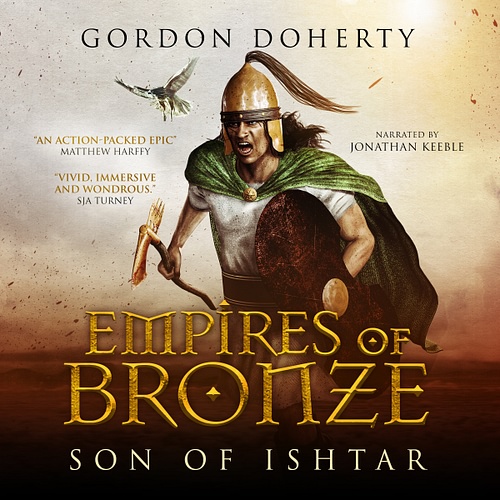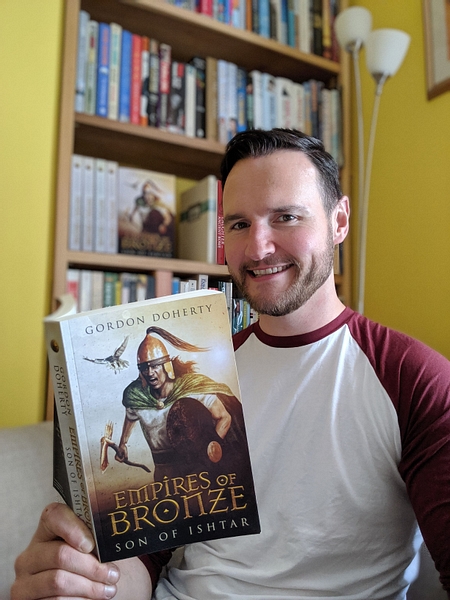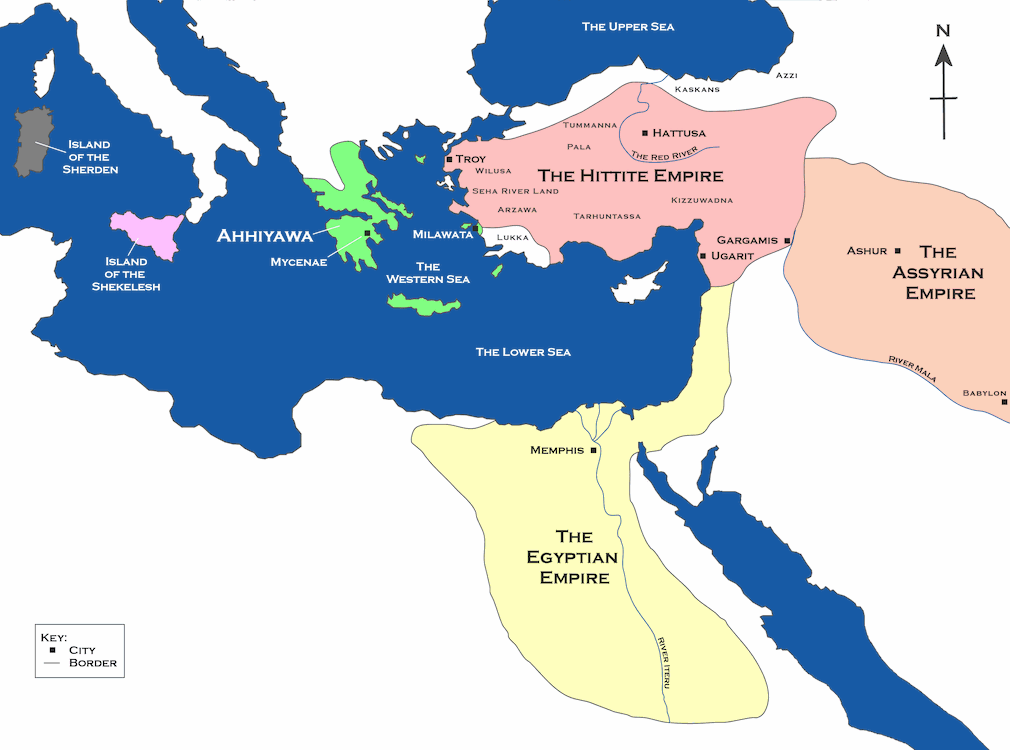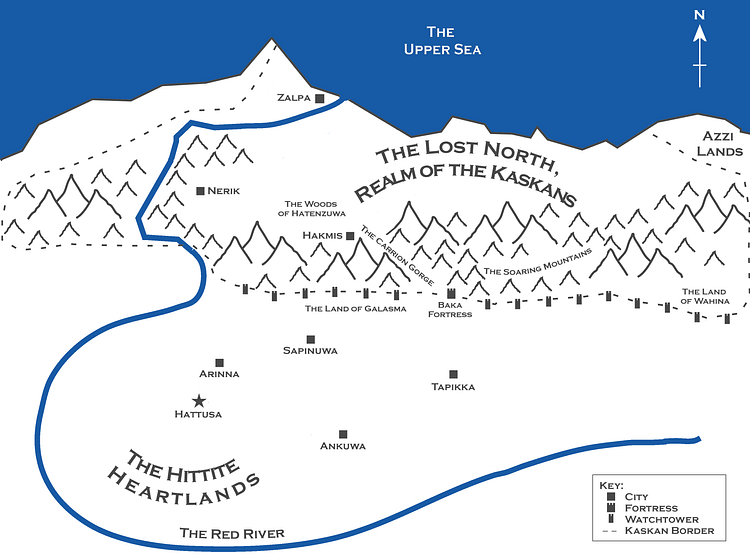Today we sit down with Gordon Doherty to discuss his new book Empires of Bronze: Son of Ishtar. Based in the dark and cold north (i.e. Scotland), Gordon has written extensively on ancient Greece and Rome. His new novel, however, takes us further back to the Late Bronze Age, into the Hittite Empire of Anatolia.
The Hittites are not exactly "pop-culture history" like the Egyptians or Romans are. What gave you the idea to write about this culture and time period?
I knew from the off that I was choosing a 'non-box-office' niche to write about. But is that not half the fun - exploring the unexplored? And what a journey of discovery it has been, through an age of fact and legend, of waxing and waning empires, cloaked in the mists of prehistory. The Empires of Bronze time period takes in the Battle of Kadesh (the earliest battle ever recorded in any detail - so grand in scale that some refer to it as the true first world war); then there was the small matter of the Trojan War; oh, and the hotly-debated subject of the Bronze Age Collapse - where the great seats of ancient power were swept away and historians still do not know the cause: famine, earthquakes, or the invasion of the mysterious Sea Peoples?

Where did you get the inspiration for the characters and storyline from? Are there historical myths and stories that you used to build the story in your novel?
History, as always, inspires me, shocks me and thrills me. The Hittites wrote everything down on tablets, so we know a lot about their myths and gods - such as the storm god's battle with a demon serpent - a perpetual struggle of good vs evil. They were polytheistic (their territory was known as 'The Land of 1000 Gods') verging on pantheistic (they believed every rock, tree, and river had a spirit). This type of temple culture - typical of the Bronze Age - oozes legend and lore. As for 'real' things, I was quickly drawn to one Hittite Prince. According to the tablets found underneath the ancient Hittite capital, Prince Hattusilis, or Hattu for short, was born under a shadow. The tablets tell how he was a sickly child, and that Ishtar, the goddess of love and war, came to his father - the king, or Labarna - in a dream, offering him a chance to save the child. But Ishtar's offerings were well known in the ancient world for being bittersweet, and this one was bitter indeed. What a perfectly dark starting point for an ancient tale!
Where there are gaps in the ancient texts and monuments (and there are lots), I let my imagination take control. Always, though, I try to stay within the boundaries of plausibility. That is not to say I do not graze those limits from time to time, but I do want my worlds to be faithful to the ancients and their ways and attitudes.

You have written extensively about ancient Greece and Rome. Did you find entering a different period and location difficult?
Yes! This was a monumental undertaking. In the 2nd millennium BCE, none of the classical foundations upon which I have been able to rely for my Greek, Roman, and Byzantine tales had yet been laid. The world of the Hittites was very different and strange. There are some things from Bronze Age culture which later influenced the Classical Greeks - it is quite clear that the Olympian gods are derived from the Hittite and other Near-Eastern pantheons. Zeus and his thunderbolts = the Hittite storm god, Tarhunda, for example. But apart from that, the Hittite world is a very unusual place. The punishment for bringing food to the king with dirty hands? You would be forced to eat a plate of warm human feces (washed down with a cup of urine)! How to settle a marital argument? Spit in a sheep's mouth, of course! If a stranger murders a man on your land… you are the one responsible!
How did you go about background research? Much less is known about the Hittites and their wars, simply because the Bronze Age is so much further back in time than the more popular cultures of Rome and Greece.
With any historical fiction series, I always find that one book tends to emerge as the lynchpin of my research. Ammianus Marcellinus' De Res Gestae for Legionary. Michael Attaleiates' History for Strategos. Thucydides' History of the Peloponnesian War for Assassin's Creed Odyssey.

So I had to find my Hittite 'bible'. This time I found it in the shape of a more modern voice. Trevor Bryce's Kingdom of the Hittites is comprehensive and accessible - it actually reads like a novel in places. That gave me my framework and allowed me to draw out a timeline of the Hittite civilization. I then worked out what section of the timeline my series would cover. Next, I bought up a swathe of books, visited various university library collections, and made good friends with very clever Hittite archaeologists, who furnished me with hundreds of papers and theories. Slowly and painstakingly, I drew up a collection of my own documents, painting my version of the Hittite world, derived from all of these sources. Then, most fun of all, I travelled across northern Turkey and explored their lands for myself - check out my Great Hittite Trail research trip.
Do you condense historical facts, events, and characters into one story even though they might have been further apart either temporally or spatially?
Absolutely! The fact is our current understanding of the Bronze Age is very approximate. There are competing chronologies, each based on things we can pin down in time - such as solar eclipses recorded in Hittite or Egyptian reliefs - against things recorded in relative terms - such as the eclipse witnessed by the Hittite King Mursili I in the 10th year of his reign. I have shifted events around in places to make for a more compelling narrative. I am an amateur historian, but a professional storyteller. Thus, story comes first for me.

How much of your book would you say is made up for dramatic effect and what is historical fact? How could a reader make the difference?
Given the paucity of detail we have, I would say there is a 60/40 split of historical fact and artistic license. Even then, the 40 percent 'fantasy' is often based on plausible likelihoods given the framework provided by the 60 percent truth. I always confess these things (the shifting of timescales and locations/ages of characters) in my author's note. I'd much rather a reader got annoyed with me for compressing events than got bored halfway through a book where I described five years of nothing happening. I aim primarily to entertain and hopefully to stoke that same interest in my readers as I experienced when I was younger - that need to explore and discover more for myself.
Thank you very much for the interview! We are excited about your new book.





